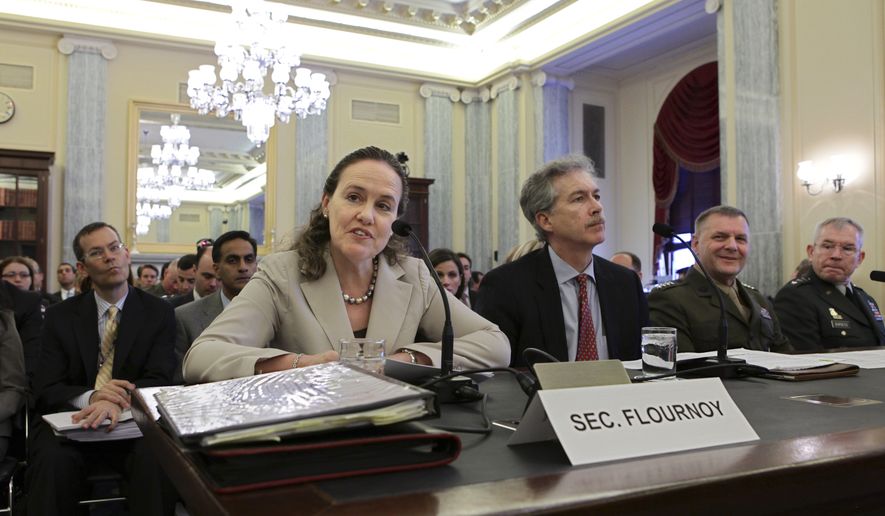Passing muster in President’s Obama’s protective inner circle could have been daunting for Michele Flournoy, whose ranking as defense secretary frontrunner collapsed in 24 hours.
For one, the think tank Mrs. Flournoy founded in 2007 harshly criticized Mr. Obama’s Pentagon budgets a few months after she left the Defense Department in 2012 as its undersecretary for policy.
But perhaps more pointedly, she signed onto an independent panel’s assessment in July that said Mr. Obama’s four-year plan for the military, known as the Quadrennial Defense Review (QDR), is too weak and should be rewritten.
Mrs. Flournoy let it be known soon after Defense Secretary Chuck Hagel announced his resignation on Monday that she did not want to be considered as his successor.
A source familiar with her thinking said she bowed out for family obligations.
Speculation inside the Pentagon is that she is waiting for a chance at the job from a President Hillary Clinton, with whom she has close ties. Being a new defense secretary in a new administration has its advantages over finishing Mr. Hagel’s two years with a White House guard that did not like the current secretary’s internal criticism of Syrian policy.
“We are better served with her at the start of an administration,” a military officer at the Pentagon said.
Mrs. Flournoy, and fellow Democratic Party loyalist Kurt Campbell, rolled out their new think tank in 2007. And who was there prominently to deliver the keynote address: then-Sen. Clinton, who went on to become secretary of state.
“Hillary Clinton and Michelle Flournoy have spent a lot of time together in the White House Situation Room,” said P.J. Crowley, who was Mrs. Clinton spokesman at the State Department. “They know each other well and share a mutual admiration. Given her strategic mind, I believe she would be an outstanding secretary of defense.”
Mrs. Flournoy is back at the Center for a New American Security as its chief executive officer.
She initially returned to CNAS from the Pentagon in February 2012 as a member of the board of directors. That May, the center issued a tough-talking paper on the drawbacks of Mr. Obama’s defense budget — a plan she helped write on the inside.
“The Pentagon still has not enacted the types of reforms that we believe are necessary to sustain U.S. military pre-eminence into the future,” said the report, “Sustainable Pre-Eminence: Reforming the U.S. Military at a Time of Strategic Change,” written by four think-tank scholars.
“Too many [Department of Defense] structures, processes, programs and operational concepts are legacies of the past, which create unnecessary redundancies, waste valuable resources and encourage unproductive competition among the services, rather than cooperation. These practices are no longer acceptable in the current fiscal environment.”
The scholars, including a retired three-star Army general, called for slashing buys of the Air Force, Navy and Marine Corps F-35 multi-role fighter.
A spokesperson at the time said the report, which carried the center’s banner, represented the views of the four authors.
Mrs. Flournoy had a more direct role in another study that took apart Mr. Obama’s and Mr. Hagel’s four-year military plans.
She sat on the independent 10-member National Defense Panel, a group of ex-military officers, politicians and civilian policy makers appointed by the Pentagon and Congress to review the 2014 QDR. The QDR sets the military’s overall structure of troops and weapons based on global threats.
The panel called Mr. Obama’s force structure “inadequate given the future strategic and operational environment.”
More broadly, the panel said Mr. Obama should retract the QDR’s overriding theme which reduced the military’s global capacity from being able to defeat two enemies nearly simultaneously to defeating one and denying the objectives of a second.
“The international security environment has deteriorated since then,” the report said in July. “In the current threat environment, America could plausibly be called upon to deter or fight in any number of regions in overlapping time frames.”
• Rowan Scarborough can be reached at rscarborough@washingtontimes.com.




Please read our comment policy before commenting.